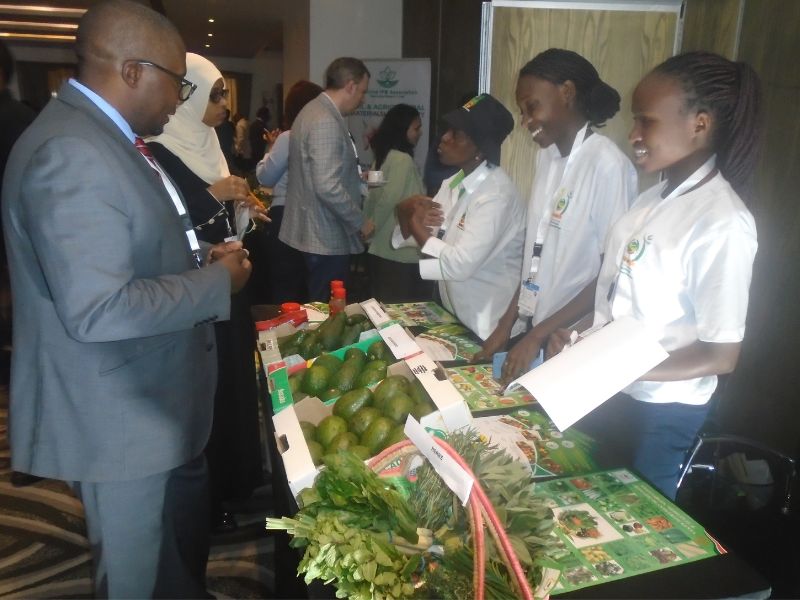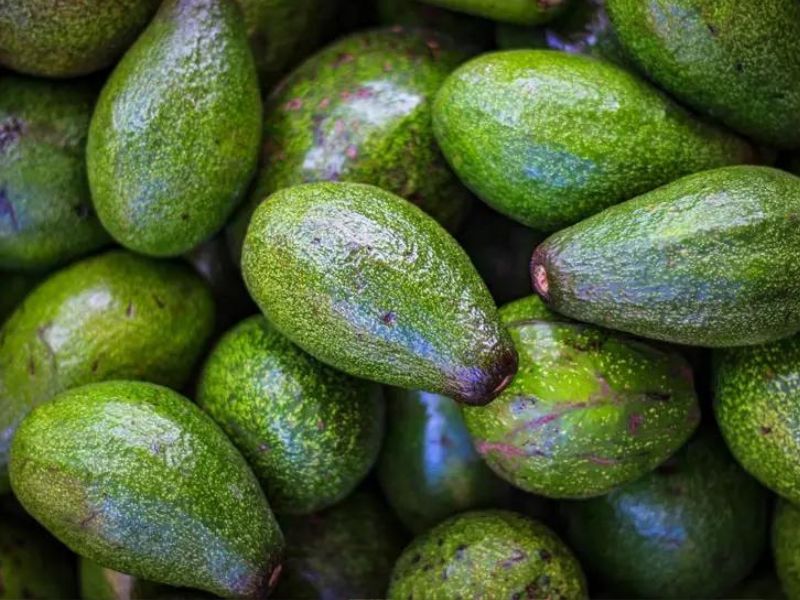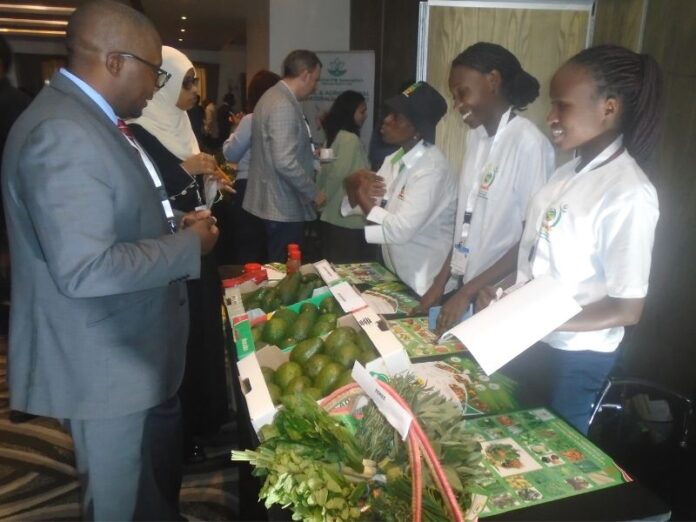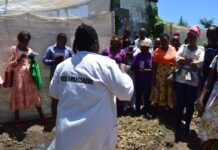|
Getting your Trinity Audio player ready...
|
By Henry Owino
Nairobi, Kenya: Unprecedented demand for horticultural crops in Kenyan markets amid shortages in foreign markets has poised opportunities for local farmers. The most in-demand are vegetables and fruits believed to boost the body’s immune systems due to their nutritional value.
With the advent of Covid-19 in early March 2020, health personnel encouraged citizens to eat plenty of fruits and greens hence the demand. Urban dwellers even began growing their foods on balconies, and other open spaces available in their rental compounds.
Currently, horticulture is a major source of income and nutrition for many households in the East Africa region. In Kenyan, the sector is the third largest foreign exchange earner generating around 150 billion shillings annually and supporting millions of livelihoods.
However, the sector continues to grapple with constraints along the value chain compounded by uncoordinated markets and limited know-how by many small-scale farmers to produce high-quality crops.
While delivering the keynote address to horticulture stakeholders on behalf of the Principal Secretary, State Department for Crop Development, Josephine Simiyu-Head of Regulations and Compliance at the Horticulture Crops Directorate-Agriculture and Food Authority, made those remarks.
Simiyu was addressing horticulture stakeholders from Sub-Saharan Africa at a conference held in Nairobi, Kenya. She revealed that Kenya’s Agriculture Sector Transformation and Growth Strategy (ASTGS), 2019-2029, highlights the Government’s initiatives to build households’ food resilience by increasing smallholder farmers’ incomes through supporting high agricultural productivity and value addition.
“The 10-year strategy recognizes that Kenya’s vibrant agribusiness sector has tremendous potential to be a powerful engine of transformation. The implementation as much as possible is to be done through the private sector.” Simiyu affirmed.
Phillip Harsama, PS, State Department for Crop Development, said Agriculture Sector is the mainstay of Kenya’s economy contributing over 33% of total Gross Domestic Product (GDP) and an additional 27% to GDP through linkages with manufacturing and service-related sectors.
It also employs 40% of the total population and about 70% of the rural population while it accounts for 65 percent of the country’s export earnings.
“Indeed, the theme of the conference, Resilient Fruit and Vegetable Value Chains: Nourishing Our Lives, Empowering local communities and cottage industries. clearly demonstrates that the Agriculture sector is central to economic growth and transformation for many countries,” Harsama observed.
According to Harsama, horticultural exports have undergone tremendous growth in the last 10 years, from KES 80 Billion in earnings in 2013 to about KES 160 Billion in 2022. The development trend has been very encouraging and the country has been able to earn the much-needed foreign exchange, besides providing food for the population, employment, and providing raw materials for the processing industry.
“I am delighted to note that in this conference, key stakeholders and experts from academic, government, non-profit, and private sectors of horticulture, nutrition, gender equity, youth engagement, and agri-entrepreneurship, have gathered to speak, discuss and share their experiences from within the region and beyond,” Harsama encouraged participants.
“There is a need to enhance linkages with researchers, academia, extension providers, and regulators to meet the ever-growing demand for market volumes and quality of our fruits,” he added.
The critical role of fruits and vegetables for healthy populations and economic empowerment of smallholder farmers; forming partnerships for sustainable development of the horticulture sector, bridging gaps among sector actors; nurturing resilient horticultural value chains, and overcoming climate change and other food system shocks are necessary.
Government Policies
 The PS said the government has put in place policies that have facilitated investments into the horticulture sector and deliberately improved rural infrastructure that has enabled the movement of products across the country and the establishment of private cooling chain facilities to support post-harvest handling of the fruits and vegetables.
The PS said the government has put in place policies that have facilitated investments into the horticulture sector and deliberately improved rural infrastructure that has enabled the movement of products across the country and the establishment of private cooling chain facilities to support post-harvest handling of the fruits and vegetables.
Further, the Government has facilitated horticulture development through tax-free imports of some farm inputs and the development of export logistic handling facilities at the port of exit. Important to note is that exporters of processed horticultural products are exempted from paying levies as part of the government’s initiative to reduce exports of primary products.
The government has actively tried to mitigate Kenya’s reliance on European markets by opening new trade and flight routes to other countries, particularly the US, China and Russia, and the Middle East, well as promoting Kenya’s entry into regional value-chains, particularly for small- and medium-sized players
The promotion of exports goes hand in hand with the promotion of products for the markets and processing, as well as local consumption.“
“In Kenya, we have champions of value addition including exporters and processors who produce mango pulp (puree), juices, jam, jellies, crisps, cosmetics among other products for domestic and export markets,” PS Harsama pointed out.
The world is now going green using renewable energy for environmental conservation. The Kenya government has put measures to encourage climate-smart and sustainable production practices through resilient value chains that can withstand climate shocks and sustain livelihoods.
As countries around the world race to fight the effects of climate change, carbon trading continues to gain popularity.

Challenges of horticulture
The lucrative horticultural industry has faced several constraints namely; Low incentives in terms of local market prices, High costs of inputs (seeds, fertilizers, pesticides), Stringent international standards and market requirements, which are a barrier to accessing the export market, post-harvest losses and lack of quality to improve consumer acceptance.
The National Government, in collaboration with other stakeholders, is addressing these challenges, through improved market linkages and access, empowerment of farmers, and strengthening of support institutions under the Ministry of Agriculture, including AFA.
To this end, all stakeholders are encouraged to work very closely with the Government, and Food Authority offices to access these beneficial services.
The PS encouraged horticulture participants in different players along the fruit and vegetable value chain to bring out challenges within the value chain and come up with interventions and chart a workable way forward. This is because horticulture has the potential to inspire change in communities and the country at large.
Erin McGuire, Associate Director, Feed the Future Innovative Lab for Horticulture (ILH) said fruits and vegetables play a crucial role in nourishing communities. She was excited to collaborate with International Centre for Evaluation and Development (ICED) and the global partners in addressing challenges and seizing opportunities in horticulture.
“Together, we strive to ensure that East African families have access to essential nutrients while ensuring farmers can generate successful livelihoods within horticultural production and marketing,” McGuire said.














